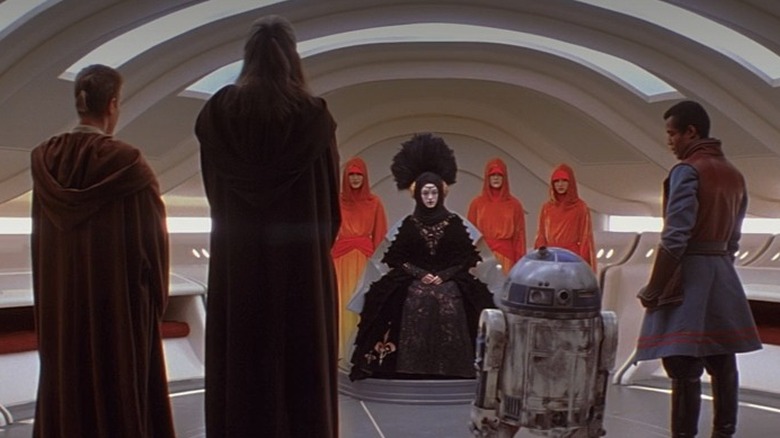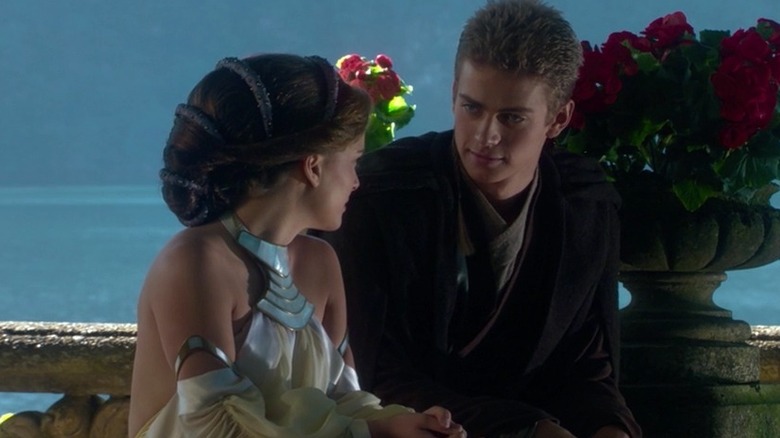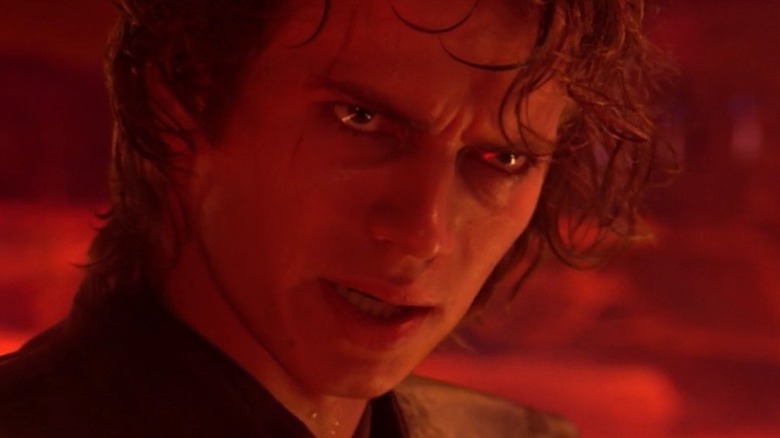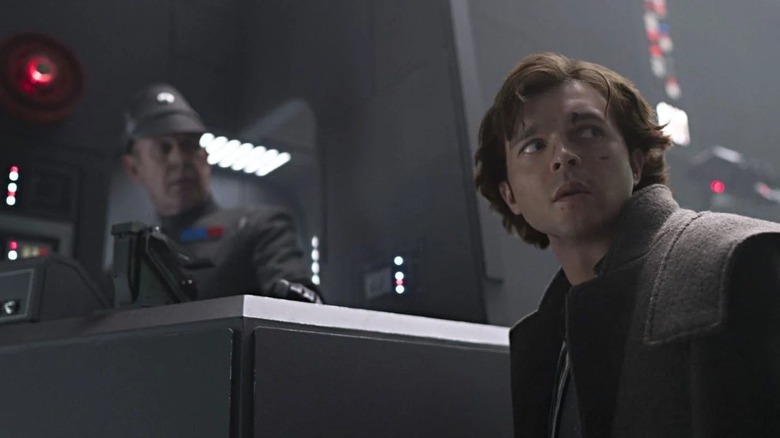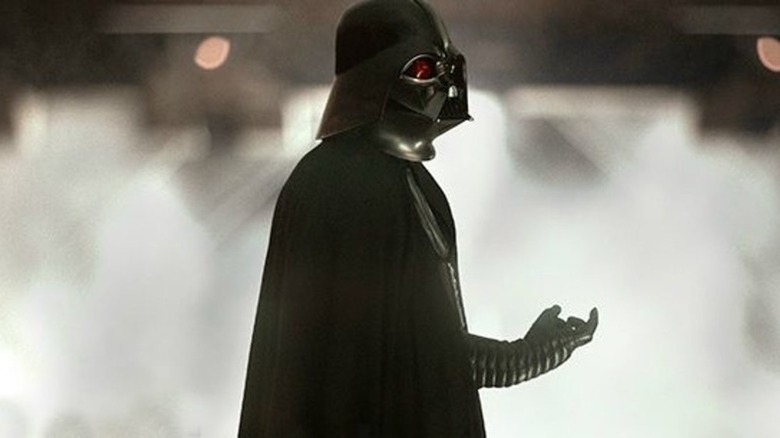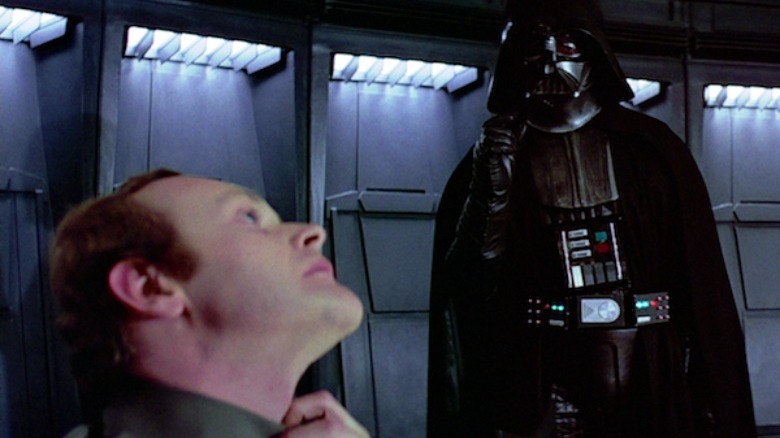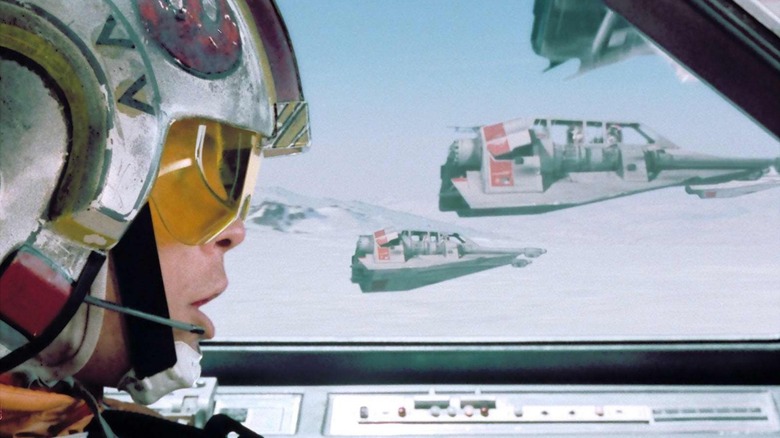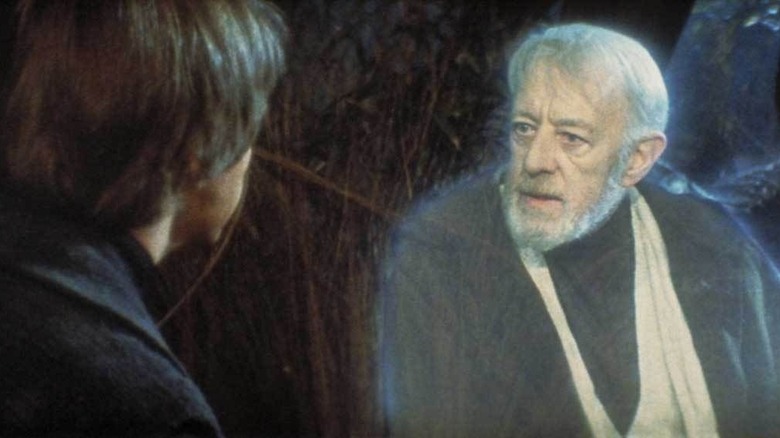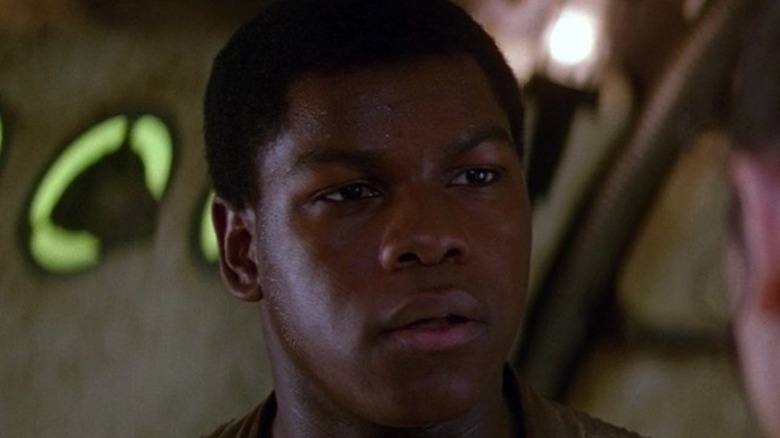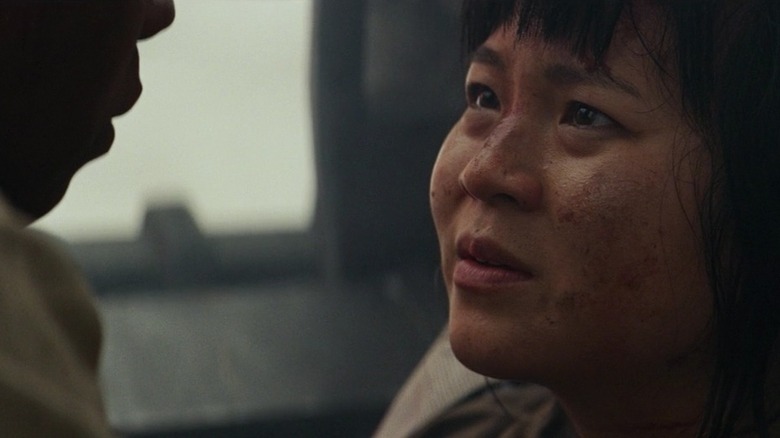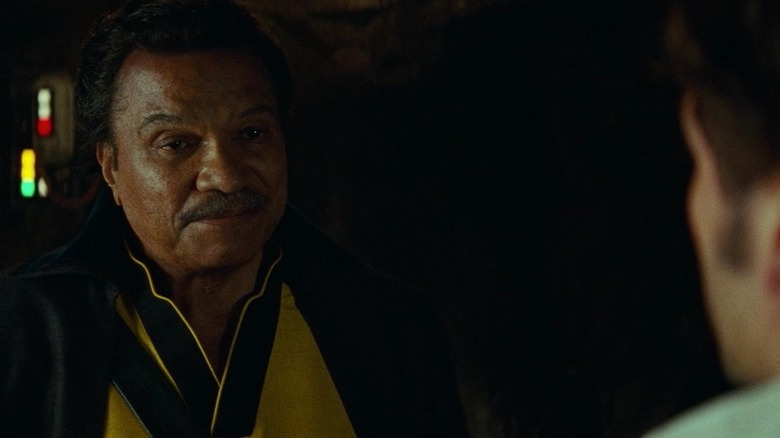The Dumbest Line In Every Star Wars Movie
Among many other things, the fictional universe of "Star Wars" is known for the wisdom imparted by its prophetic Jedi. Sage figures like Obi-Wan Kenobi and Yoda impart important nuggets of truth to Luke Skywalker in the original trilogy, and even though Qui-Gon Jinn would not live to see the boy grow to adulthood, before his passing he tells the young Anakin Skywalker, "Your focus determines your reality."
But among the lines that arguably belong in lists of the most poignant dialogue ever written, there are also words that could possibly be called wisdom, in the sense that they teach the listener the important lesson of not saying something quite so moronic themselves. Whether it's while battling to the death above the flaming rivers of Mustafar, running from crooks and stormtroopers on Corellia, or contemplating how to defeat the seemingly unbeatable Final Order, Star Wars characters occasionally say some pretty dumb stuff, and we're here to give our votes for the absolute worst of that dialogue.
For your consideration, here are the dumbest lines in every Star Wars movie.
Do they thank toasters for making toast, too?
The prequels are low-hanging fruit when it comes to bad dialogue; pretty much all of them have more than their fair share of stinkers. One standout in "The Phantom Menace" comes from a pretty dumb line in a fairly ridiculous scene that unfolds right after the Naboo Royal Starship barely makes it through the Trade Federation's blockade. The heroes only survive the attempt because of a famous droid.
We're speaking, of course, about R2-D2. The droid is brought before Sabé, the queen's decoy (though this has yet to be revealed). By both Sabé and Captain Panaka, R2 is afforded more honor than most people in the entire "Star Wars" mythos for, essentially, just doing its job. While the assembled officers and royalty gush over the droid, Qui-Gon and Obi-Wan wait patiently nearby to discuss trivial things like, you know, where they're going to hide from the people trying to kill them while they make ship repairs. Sabé finally ends the droid-stan gathering with, "Padmé, clean this droid up as best you can. It deserves our gratitude."
So not only do the heroes give a robot a congratulatory audience with a monarch ((albeit a fake one) when in the rest of the films' droids are kicked out of bars and abruptly have their memories wiped, but the decoy queen orders the actual queen to give it a bath? Seriously? How does Padmé not turn around and slap her lookalike upside the head? She's supposed to be protecting Padmé from assassins, not pranking her by making her clean mobile wastebaskets.
Be quiet about the sand
There are likely no more hated and thoroughly mocked words in all of "Attack of the Clones"—perhaps in the entire Skywalker Saga—than Anakin Skywalker's creepy lines about sand. After Padmé tells her Jedi suitor about how she and her classmates used to swim to a nearby island, lie in the sand, and try to guess the names of birds, Anakin tells her, "I don't like sand." Romantic!
He continues, "It's coarse and rough and irritating, and it gets everywhere. Not like here. Here everything is soft... and smooth." If there's anything left in your stomach after he delivers the first couple of sickening sentences, then it's during this last line that Anakin begins caressing Padmé in a way that will almost certainly purge it completely. Hayden Christensen's monotone delivery doesn't help matters.
Knowing that this is probably a reference to his upbringing on Tatooine doesn't make it any better. Sure, it makes sense that, having grown up enslaved on a desert planet, Anakin hates sand—just like if he grew up on Hoth he'd hate snow, or if he grew up on Jakku he'd, well, still hate sand probably. It's that somehow this awkward, stilted nonsense actually works on Padmé. She's a senator and a former queen, and she's wooed by this corny drivel. It's indicative of what's so off about the Anakin-Padmé romance from beginning to end: Nothing about it feels real.
From our point of view, this line makes no sense
it is genuinely difficult to choose the worst line of "Revenge of the Sith." Love the movie or hate it, you have to admit it's got some duds. The fierce contenders include Obi-Wan's warning about the "high ground" toward the end of his duel with Anakin, the medical droid that tells Obi-Wan it has no idea why Padmé is dying and then immediately contradicts itself by saying "she has lost the will to live," Palpatine's random "ultimate power" exclamation while killing Mace Windu, and Vader's tragically laughable "Nooooo!"
But we think the prize has to go to a line that feels like it was written while someone was really tired. During a break during their lightsaber duel on Mustafar, when Anakin continues his paranoid ranting and Obi-Wan tries to talk sense into him, Obi-Wan exclaims, "Anakin, Chancellor Palpatine is evil!" Anakin retorts, "From my point of view, the Jedi are evil."
Picture it: You've just murdered a whole bunch of people. You almost murdered your romantic partner. You have just forsworn everything you dedicated your life to and you are currently battling your former mentor over a river of lava. That man calls your new master—the man for whom you have thrown away everything that made your life worth living—evil, and you reply like a fifth grader's response to an in-class writing prompt?
No. That's not how emotions work.
Seriously? That's how he got the name?
Early in "Solo: A Star Wars Story," Han runs from both crooks and stormtroopers on Corellia. Seeing no other option, he approaches a recruitment booth for the Imperial military and signs up. When the recruitment officer asks him his last name, adding "Who are your people?" Han responds "I don't have people. I'm alone." The officer thinks for a moment and says, "Han... Solo."
And so the iconic name is born, and it doesn't make a lot of sense. On one hand, in a military as massive as the Empire's, with recruits from so many worlds, you have to assume Han is hardly the first one to sign up without a last name. Wouldn't the Empire already have some kind of standard operating procedure in place in those cases? Does that mean there are thousands of other people around the galaxy with the last name "Solo" now, kind of like how so-called "bastards" in "Game of Thrones" from the north all have the last name Snow? On the other hand, how does Han not already have his own self-determined last name in place? He's certainly used to making up tall tales, but he can't come up with his own last name?
Not to mention, perhaps of all Han's scenes in "Star Wars," here he feels the least like the Han we know and love. The way he delivers the lines "I don't have people. I'm alone," feels a lot more teen-angsty than Han ever should.
Vader and puns don't make for a great mix
There is no more intimidating figure in all of "Star Wars" than the cybernetic Sith Lord Darth Vader (Darth Maul gives him a run for his money, but you can't beat a classic). His time in 2016's "Rogue One" is brief but memorable. The hallway scene toward the end of the film, when he brutally takes apart rebel soldiers pursuing the Death Star, receives a lot of well-deserved praise. But in an earlier scene, a single sentence makes him seem just a little bit less scary than usual.
When Director Krennic is summoned to Vader's fortress on Mustafar, he's visibly shaken by Vader's presence—and with good reason. When Vader abruptly ends their conversation and walks away, Krennic suddenly develops a little backbone, calling after Vader to ask if he's still in command and whether or not Vader will speak to the Emperor for him. Vader uses his feared Force choke on Krennic, though unlike how such scenes usually end, he lets the director live. He releases Krennic right after saying, "Be careful not to choke on your aspirations, director."
It's not the worst line in the galaxy, but it's a little too punny. This is Darth freaking Vader. Darth Vader isn't Arnold Schwarzenegger about to kill the main villain; he doesn't do puns.
Darth disses the Death Star
Perhaps the worst line of dialogue in the film that started it all, "Star Wars: Episode IV—A New Hope," is delivered as the Empire's top military brass are debating the threat of the Rebel Alliance. When Admiral Motti insists the Death Star is now "the ultimate power in the universe," Vader retorts by warning, "Don't be too proud of this technological terror you've constructed. The ability to destroy a planet is insignificant next to the power of the Force."
First of all, the "technological terror" alliteration is pretty silly coming from Darth Vader. Second, destroying a planet is "insignificant?" Alderaan's Department of Tourism probably wouldn't call it insignificant. The Empire spends two of the original trilogy's three movies doing everything it can to stop the destruction of that "technological terror," and all of "Rogue One" just trying to stop other heroes from getting its schematics. Third and finally, this simply doesn't sound like something Vader would say. He's not in the habit of giving lessons on the Force to Imperial officers. It just comes off as a clumsy setup for his Force choke on Motti and, ironically, one of the best lines in the film: "I find your lack of faith disturbing."
Make up your mind, Luke
The good guys suffer a lot of setbacks in 1980's "The Empire Strikes Back," beginning with the Empire's discovery of the Rebel base on the frozen planet of Hoth. The Empire deploys their gargantuan AT-AT Walkers to assault the base and destroy its main generator, and the Rebels meet them with their speeders, led by Luke Skywalker.
After several passes with their speeders and pelting the Walkers with lasers, nothing seems to even slow the things down. Luke tells the rest of the pilots, "That armor's too strong for blasters." He switches methods, instead trying to trip the AT-AT Walkers up with the speeders' harpoon lines. About two minutes later, Luke's buddy Wedge manages to bring one of the Walkers crashing to the ground with his harpoon line, to much applause from the ground troops.
As soon as the Walker is on the ground, a couple of laser shots make it explode before you even have time to say "What armor?" So it isn't that Luke's line about the armor being "too strong for blasters" is dumb, it's just apparently very wrong. After all, how does the Walker getting knocked to the ground weaken the armor on the part of the AT-AT that isn't even touching the ground? Suspend disbelief you must.
For a ghost, Obi-Wan is a jerk
In 1983's "Return of the Jedi," the Force ghost of Obi-Wan Kenobi is so amazingly full of, well... of something all the heroes were probably wading in when they fell in the Death Star's trash compactor.
When Obi-Wan appears before Luke on Dagobah, Luke asks his first Jedi teacher why he didn't tell him the truth about Luke's father. Obi-Wan responds by saying that when Anakin switched teams, he was "destroyed" and became Vader. He ends with, "So what I told you was true... from a certain point of view."
Luke should have dropped everything until he could find a way to smack Obi-Wan's Force ghost. Go back to "A New Hope" and watch Obi-Wan's face when he tells Luke about Anakin. You can see the lie brewing before Kenobi opens his mouth.
Even if you ignore that and choose to accept Kenobi's contention that Anakin died when he became Vader, what he tells Luke in "A New Hope" is still a lie. Kenobi initially tells Luke that Darth Vader, not Anakin, was a "young Jedi" and "a pupil" of his, while according to Kenobi's "certain point of view," Vader doesn't exist until Anakin stops being a Jedi. There is no point of view from which Obi-Wan wasn't lying, except from the point of view of big stupid liars. Just admit it, dude. You're a ghost. No one can ground you.
Stop being creepy, Finn
In "The Force Awakens," not long before Han Solo recaptures the Millennium Falcon, something goes wrong with the ship's motivator. While Rey desperately struggles to fix the problem before the ship is filled with poisonous gas, Finn whispers to BB-8, confiding in the droid that he's not a part of the Resistance. He then convinces BB-8 to reveal the location of the group's secret base. With that accomplished and Rey still racing the fix the motivator, Finn tries to convince Rey to not go back to Jakku, and among other things asks her, "You got a boyfriend? A cute boyfriend?"
It's creepy, it's not characteristic of Finn, and it just doesn't make sense given their dire situation. Finn's just run from lifelong service to the First Order, believes the man who helped him flee is dead, and just barely survived a battle with TIE fighters while racing through the guts of an old Star Destroyer. On top of all that, he is lying to Rey about being part of the Resistance, is waiting to see if she can save the both of them from being poisoned to death, and is trying to convince her to not go back to the planet they both just narrowly escaped. Oh, and let's not forget the woman he's hitting on beat the crap out of him on Jakku about 10 minutes before all this. And he wants to know if she has a boyfriend? The line is funny and delivered well, but makes no sense.
Rose, you are incorrect
Toward the end of "The Last Jedi," the Resistance is cornered by the First Order on Crait and things are looking bad. Finn disobeys orders and attempts to sacrifice himself to destroy the First Order's heavy cannon before it can decimate the heroes' defenses. Rose Tico, however, won't let him go through with it. She plows her speeder into Finn's before he can ram the cannon, and both of their speeders crash. As Finn clears the wreckage from Rose's speeder, he asks why she stopped him. She answers that she saved him because "That's how we're gonna win. Not fighting what we hate, saving what we love."
It's a beautiful way for Rose to reveal her feelings for Finn, but the sentimentality is a little over the top. "Saving what we love," is not, in fact, how the heroes of the "Star Wars" saga generally defeat the enemy, though it is usually a benefit. They win by blowing up the things trying to destroy what they love, like droid control ships, Death Stars, Starkiller Bases, or, you know, the cannon Finn was trying to destroy. That may not be as romantic, but it's the truth. Also, Finn was trying to save what he loved: the Resistance and all of his friends. Not that Finn dying would've been a good thing, but he was doing exactly the thing Rose said he should be doing, and she stopped him.
Want some wine with that cheese, Lando?
Things don't look good for the Resistance in 2019's "The Rise of Skywalker." Leia passes away, leaving Poe Dameron in charge. Not long after, Poe learns of the destruction of the planet Kijimi and with it the revelation that the Final Order's Star Destroyers are much better at living up to their namesake, as each one is equipped with planet-killing weapons similar to those of the Death Stars.
Poe visits Leia's body, looking for some kind of guidance from beyond the grave. Instead, the "wisdom" Poe is looking for comes in the form of Lando Calrissian. Lando assures Poe that neither he nor any of the heroes of the original trilogy were any more ready to face the Empire than Poe is to go head-to-head with the Final Order. Poe asks Lando, "How'd you do it? Defeat an empire with almost nothing." Land responds, "We had each other. That's how we won."
Poe seems inspired by Lando's words, and he really shouldn't. They belong on a bumper sticker and nowhere else. Lando's words offer an utterly empty platitude. Apparently, they give Poe the inspiration to ask for help from allies, but wouldn't he have done that anyway? Who wouldn't?
Not to mention that, while Lando eventually redeems himself, a cheesy sentiment like "we had each other" is kind of weird coming from the guy who ultimately abandons Han in "Solo" and in "The Empire Strikes Back" turns his friends over to Darth Vader and Boba Fett.

